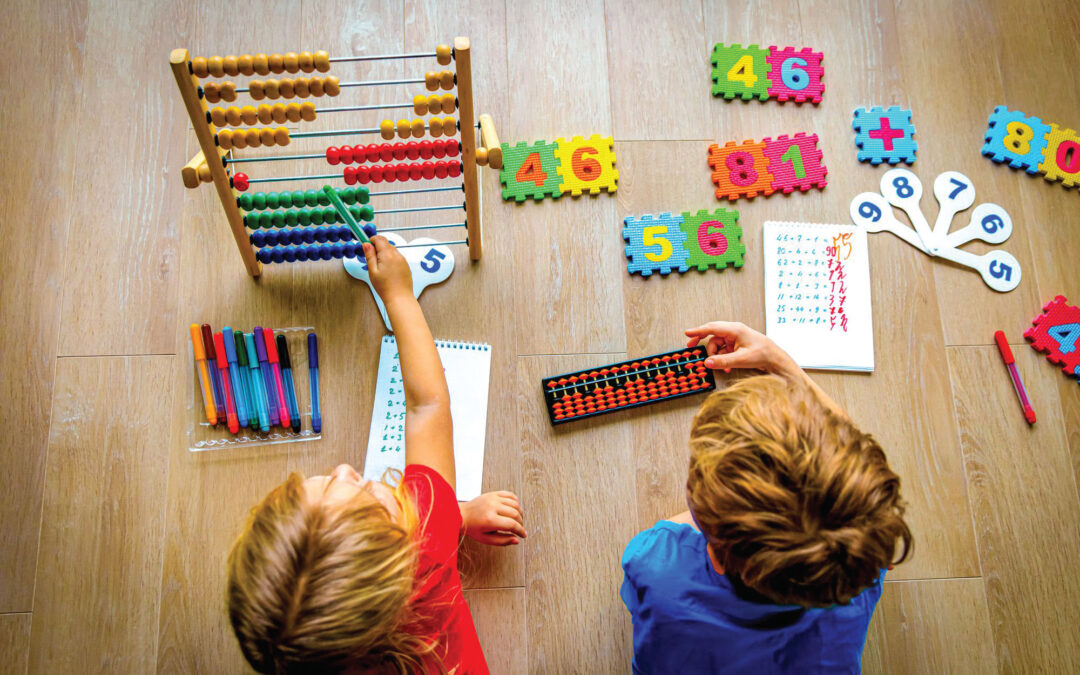Being a former teacher, I typically get questions at this time of year about how to address the dreaded “summer slide,” the loss of learning that takes place when kids have months off from school during the summer. If a long break makes parents nervous, reflect on an odd spring of 2020, followed by summer break, topped off with a rocky start to the 2020-2021 school year. Stir in some hybrid learning or possible quarantining, then roll that all into summer break 2021. It’s no wonder that parents are increasingly worried about pandemic-related learning loss!
It’s certainly reasonable for parents to be concerned about these educational gaps, which are being referred to as the “COVID slide.” Data released in November 2020 by the Northwest Evaluation Association sought to provide a comprehensive national overview on learning loss related to COVID-19. Based on test scores, the reading loss was relatively minimal, while math was the subject most affected. Math scores dropped an average of 5%-10% when compared with 2019. If that was the loss in math scores in November 2020, imagine what the results would be now.
Before we look at ways to help our children close the gap between expected learning levels and current levels, it’s important to remember that we, as parents, set the tone. If we project anxiety and fear, our kids will pick up on those emotions and their learning will be negatively affected. We can remind ourselves that the entire country is in the same situation and that we can only take it one step at a time.
Think long-term. Experts say it will take more than a year of supplemental learning to get to where we might have been pre-pandemic. While “more than a year” can seem intimidating, with a shift in mindset, it can actually be something that brings parents a sense of relief. We don’t have to try to cram all of that lost learning into our children at once. In fact, it will be detrimental to their learning if we try!
Reach out to your child’s current and last year’s teachers. They are best placed to know which learning standards didn’t get addressed, or which were not covered as in-depth as they would have been during a typical school year. They can also advise you as to your child’s areas of weakness. The time period just before summer break is a whirlwind for teachers, so please don’t wait until just before school is out. It is unreasonable to expect a teacher to thoughtfully respond in that short of a timeframe.
Emphasize math. Math is the one subject where it is most difficult to learn grade-level content when prior material hasn’t been mastered. Because it is cumulative in nature, a knowledge gap in one concept can set a student up for failure in all math concepts that build upon the lacking skill. Other subject areas should be practiced, but the main effort should be put into ensuring that your child has learned all he should know in math for his grade level.
Capitalize on your child’s interests. Kids are just like us – we don’t like to do work in the evenings or on our days off and neither do they. If we don’t make extra practice and supplemental learning fun, then we run the risk of turning our kids off from learning altogether. Do you have a technology lover? Look into learning games online. A budding chef? Teach math concepts such as measurement, fractions and elapsed time through cooking projects. If your child is doing something she loves, then the learning will come naturally and will be part of the fun.
Look for a learning camp or after-school program. Extracurricular options abound in Austin. Look for a camp that gets kids having fun and also reinforces skills that your child is missing. Or, choose an after-school program that feels like playtime but has built-in time for learning.
Explore district resources. Most school districts offer “summer school” for a portion of the summer. If you think your child would benefit from such a program, talk to your child’s teacher or your campus’s office staff to indicate your interest. Most summer school participants must meet certain criteria, and it is possible that your child will qualify. Indicating your interest can only help.
Consider tutoring. For busy parents, the idea of overseeing extra work or searching for resources can be overwhelming. And, driving to and from after-school programs or summer camps during work hours can feel close to impossible. Tutoring can be a great option for busy families as well as for families that like the individualized attention that tutoring offers. Tutoring ranges in pricing and can get quite expensive, but you might consider hiring an older, responsible student to tutor for a more reasonable price. Your child’s school can also be a good resource as many teachers will tutor in their free time. The office staff may be able to give you a list of teachers to contact.
Parenting during a pandemic has called on parents to put on their superhero capes in multiple ways. Identifying our children’s learning gaps and helping to close them is yet another example. The process may look messy, but deep breaths, baby steps, taking it easy on ourselves and our kids, and reaching out for help will get us all there in the end.
Alison Bogle is an Austin-based freelance writer and mom of three.


















